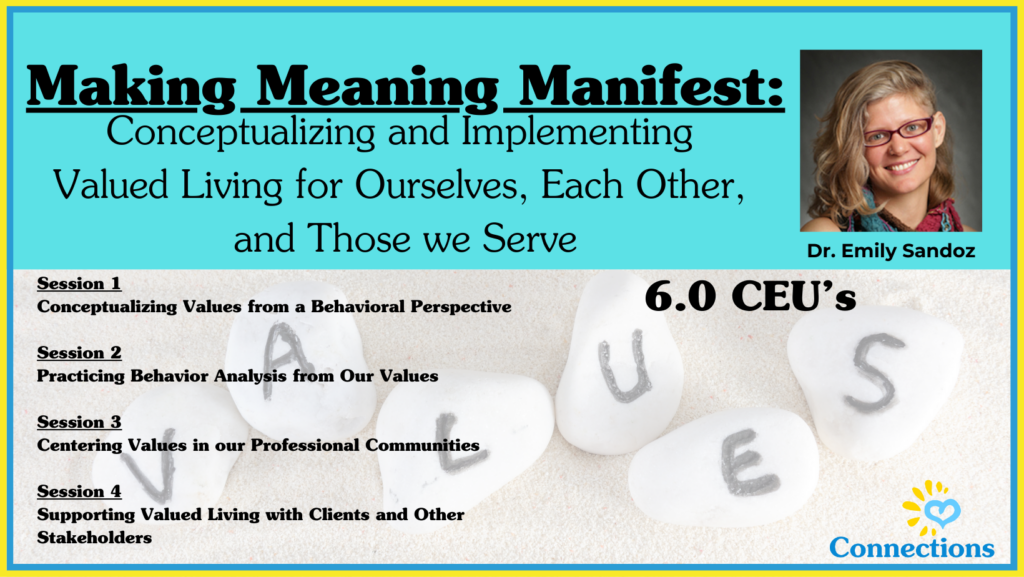Connections Behavior Planning and Intervention is excited to welcome Dr. Emily Sandoz for a Continuing Education Webinar Series for Behavior Analysts!
Session Details:
Part 1: Conceptualizing Values from a Behavioral Perspective
Learning Objectives:
- Describe appetitive and aversive functional relations.
- Describe valued living in terms of appetitive repertoires.
Abstract:
Values are of increasing interest to behavior analysts. However, definitions of values and valued living often rely on terms outside of behavior analysis, making them less immediately actionable. This presentation will first review definitions of values and valued living that have been offered, then unpack values from a behavioral perspective. This conceptual analysis positions valued living on a functional continuum of behaviors participating in appetitive functional relations, and considers appetitive learning as central to a flexible repertoire. This analysis has action implications for fostering valued living for ourselves, each other, and those we serve.
Part 2: Practicing Behavior Analysis from Our Values
Learning Objectives:
- Describe how valued living applies to personal well-being in behavior analytic practice.
- Name one contextual change they could make to foster their own valued living in their professional practice.
Abstract:
Practicing behavior analysis is not easy. Across settings, clients, and roles, taking responsibility for the growth of others’ repertoires brings unique challenges, positioning behavior analysts at relatively high risk of burnout. Buffering this risk of burnout is psychological flexibility, which involves not only clarity around values, but a robust repertoire of orienting values and other appetitives in ways that are resourcing. This mini workshop will begin with a review of valued living as presented in Part 1 and a conceptual application to how we orient toward our own work as behavior analysts, followed by an experiential exploration of our own values and capacities for appetitive learning.
Part 3: Centering Values in our Professional Communities
Learning Objectives:
- Describe how valued living applies to training, supervision, and leadership in behavior analytic practice.
- Name one contextual change they could make to center valued living in their training, supervision, and/or leadership.
Abstract:
Training, supervision, and leadership often center high stakes outcomes with less (and sometimes no) attention to the learning processes involved for the trainee, the supervisee, or the led. And behavior analysis is no exception. The more high stakes the work is, the more that outcomes are centered, often at a cost to the availability and accessibility of appetitive functional relations. This mini workshop will begin with a review of valued living as presented in Part 1 and a conceptual application to how we train, supervise, and lead behavior analysts, followed by an experiential exploration of values in our professional communities.
Part 4: Supporting Valued Living with Clients and Other Stakeholders
Learning Objectives:
- Describe how valued living applies to intervention building in behavior analytic practice.
- Name one contextual change they could make to focus their interventions on building valued living for clients and other stake holders.
Abstract:
Behavior analysis is dedicated to intervening on socially significant behaviors. Social significance, however, can be approached in a number of different ways. At times, social significance has been approached in terms of majority norms, which can limit true progress and even cause harm. Recently, however, an increasing number of behavior analysts are approaching social significance with more specificity to the client’s individual and cultural identity. Building interventions based on the values of clients, parents, and other stakeholders casts social significance in functional terms and refocuses behavior analysis on fostering valued living for all involved in the intervention. This mini workshop will begin with a review of valued living as presented in Part 1 and a conceptual application to how we focus our work on valued living, followed by an experiential exploration of how we might build valued living with our clients and other stakeholders.
About the Presenter:
Dr. Emily K. Sandoz (she/they) is the Emma Louise LeBlanc Burguieres/BORSF Endowed Professor of Social Sciences and Full Professor in the Psychology Department at the University of Louisiana at Lafayette. Emily is the Director of the Louisiana Contextual Science Research Group, which supports collaborative contributions from students and professionals from all over the world.
They have co-authored three books on acceptance and commitment therapy for struggles with eating and body image, along with chapters and journal articles on contextual behavioral science, social justice, clinical behavioral processes, and psychological flexibility. Emily has led more than 100 training workshops for professionals around the world, and serves as a peer-reviewed ACT trainer. They also practice as a Clinical Psychologist and a Board Certified Behavior Analyst, focusing on clinical behavior analysis.
BACB CEU’s included, and Cost to Attend:
- 6.0 Learning CEUs
- $114.99 (CEU’s included in price)
For questions, challenges with registration, or any other needed information, please contact Dusty, Director of Continuing Education and ACE Coordinator for CBPI, LLC, at continuingeducation@connections-behavior.com.
Connections Behavior Planning & Intervention, LLC, is a BACB-Approved ACE Provider (Provider # OP-17-2781). The BACB does not directly sponsor or endorse this event, its speakers, or its content.
JANUARYSALE
Login to Register
Please log in or register before registering for On-Demand items.

